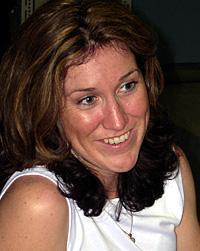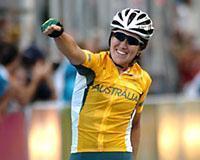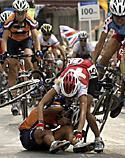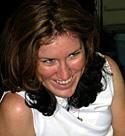
Recently on Cyclingnews.com |
An interview with Sara Carrigan, October 13, 2004
Golden girl
When Sara Carrigan breezed into the Cyclingnews office it was obvious that the buzz of winning an Olympic gold medal was a long way from wearing off. Despite being deep in the post-Athens media whirl she gave Gerard Knapp and John Stevenson an inside look at her medal-winning Olympic ride.

|
Olympic gold medallists get special treatment but the attention hasn't gone to the head of road race winner Sara Carrigan. The 24-year-old originally hails from the new South Wales country town of Gunnedah and country Australians just don't let little things like being the best in the world at something go to their heads. Very much one of Australia's most promising talents in the last few years, Carrigan's palmares includes two Australian time trial championship victories, and a round of the 2003 World Cup, but the Olympic road race was far and away her biggest win.
Since then, she's been a bit busy.
Cyclingnews: What have you been doing since the Olympic race?
Sara Carrigan: It's been very busy travelling to different places, meeting up with different friends and family and doing all those things you can't really do while you're on the road like coming down to Sydney for a couple of days. It's been fantastic and the support I've received from everyone, even people that I don't know - it's been great.
CN: You must have spent the time since you got back doing lots of media and like that. How good is this for the profile of women's bike racing in Australia?
SC: It's great. Yesterday I was on the Kerry-Anne show [Australian daytime TV]. It's been amazing, way beyond anything I expected.
CN: You've spoken a lot in interviews about what a unified team the Australian girls were in Athens. Do you think the IOC should be giving a team medal in the road races?

|
SC: There's been a lot of debate about that in the past about it being called an individual road race. We saw in the Tour de France how Lance Armstrong's team had eight men on the front for him every day for three weeks. On the last day it was great to see them with the yellow in their knicks and their jerseys but at the end of the day it's Lance Armstrong that stands on the podium and he has the record of six straight wins.
It would be lovely [to have a team award.] There was nothing I wanted more than to have Oenone and Liv there by my side. We've lived together and trained together this year. It was a special moment.
CN: How much difference did the change of coaching in the AIS women's team make?
SC: We've had so many girls coming through in the last few years I think we've hit that point where all the development over the past seven years or so that James victor has been a part of the programme we just had that much experience of knowing how to put it together with Oenone, Liv and me on the day.
Wozza has done an absolutely wonderful job to step in as he has in an Olympic year, all credit to him.
CN: Whose strategy was keeping you in effect closeted for a couple of months before the Athens road race then?
SC: It was talked about among the three of us, James, Wozza and myself. last year I went to Livigno for an altitude training camp and came out of it straight into racing with really good form so I thought that would be the best training and preparation for the Olympics this year. It was a hard decision not to do Thuringen and not to race together right before the Olympics. But for us to get a medal as a team we all had to do individually what was going to be the best preparation for us to get there and it all worked out!
CN: This year it was like the Australian women's preparation was just perfect, for example at the Tour de l'Aude you were good but not smashing everyone into the weeds. Were you still in training then so you'd come into Athens with super form on the day?
SC: Yeah it doesn't happen too often that all members of the team can go in with the form of their lives and even for the loose plan that we set out with to come to fruition. I think that because we have all been [racing in Europe] for a number of years we used that experience and knowledge and put it together for this year.
CN: How was it from the disappointment of Hamilton last year?
|
|
|
|
|
SC: We had perfect preparation, being in Italy up until two days before the event, preparing normally, naturally as though we were just going to another race. I think that was a good thing too that we weren't staying in the [Olympic] Village. We went into the village after so we could soak up the atmosphere - that was great.
CN: On race day you say there was a loose plan. You seemed to ride the first half very cautiously. Did you watch the men's race and pick up any lessons from that about how they travelled in the heat and so on?
SC: We spoke to the men after the race and got some handy little tips. They went through something like 90 bidons during the race [for five riders]. They couldn't get water up to them quick enough. There were other little tactical things. For example there was a false flat in one of the hills, but they said "by the end of the race it was no false flat." Even though we had the opportunity to ride round the course last year you don't realise what it's like till you have raced it.
CN: Was that where you attacked?
SC: Yes
CN: To go back a bit, what impact did van Moorsel's crash have on the race?
SC: At that stage attrition had started to take effect and the field was splitting up anyway. She was at the front of that bunch quite a lot and it's hard to say what she would have done for the rest of the race, but it was great what she did for us! [laughs] It was such a pity to have the defending Olympic champion out of the race though.
CN: Was there any indecision when she was on the deck, among say the Australian riders or the other riders who were considered to be among the favourites? Was it like "what do we do now?" because Van morsel was riding very much at the front in her normal dominant approach.
SC: It was in a part of the race when the attacks were going to start to come and it didn't really change our plan at all. The Dutch did a great job keeping things together till then.
CN: Do you think Van Moorsel was keeping it together for herself or Mirjam?
SC: It's hard to say. Mirjam did such a great job for Leontien in the Olympics in 2000. It gives me goose bumps just to think about it. When I saw Mirjam bring up Leontien in that sprint for the win - she did an absolutely awesome job and laid everything on the line for Leontien. Perhaps Leontien was going to return the favour this year. As you could see in that last lap Mirjam had good legs, she had a go but was reeled back in. It would have been interesting to see how it would have turned out, but I'm quite happy with the way it turned out!
CN: You weren't in the initial selection, you bridged across - was that part of the plan or a reaction?
SC: Once that little bunch had gone up the road, Oenone was in it and I was sitting in the first two or three wheels to make sure no other break was going to go across and if they did I was right there on it and Liv was up there also. The world champion Ljunskog tried to bridge across but wasn't successful, anita valen tried to get across but wasn't successful one of the Americans tried to get across but wasn't successful.
The corner coming on to the cobbles was quite dangerous so when we went round that corner I made sure I was first wheel. There was a crash behind me so I took that opportunity and went for it. I had a good gap and had the legs to carry myself across to the break.
CN: How long were you waiting till you decided to go?
 |
SC: I was probably with that little bunch for 5km. Oenone and I spoke to each other and knew we were in the strongest position with two of us there and we had to play our cards. I went up the road, the others tried to chase and Oenone played perfect team tactics, sitting in second wheel, didn't leave second wheel. Looking over the footage after we got back to Australia I didn't realise the gap that Judith and I had came down to such a small gap, eight seconds I think it was at one point.
CN: When Judith got up to you, your attitude seemed to be, "you've got up to me, this is my break, now it's your turn to work" and then you sat on her.
SC: After the race Judith said to me "If I was in your position I would have done the exact same thing". With Oenone sitting back there in the bunch we knew we had a good chance in the sprint if it came back together and I had to give myself every opportunity while we stayed away to make sure I had the legs at the finish. Judith did put in everything and you could see that at the finish; she had nothing left. I think she was happy but as you could see she was also disappointed.
CN: Phil Ligget said afterwards that it was as aggressive and tactical as a men's race. Is that a back-handed compliment?
SC: I'm going to take that as a positive compliment! Cookie was there after the race to me after the race and his comment was "They rode like men!" There's a hundred year history of the men racing, and there's been a history of the women's races being slow and boring but that's certainly not been the case in the last few years. It's progressed in leaps and bounds with the tactics and the teamwork now, it's not about individuals going out and winning it's about the teamwork as it is in the men.
CN: Stuart O'Grady said it was the hardest one-day race he's ever done. How did you cope with the heat and the humidity?
SC: It was a little bit cooler for our race because the wind had got up. We were a little bit lucky that way but I still had a bidon every lap and I still had to take some time to wee in that bottle afterwards even though I had so much water throughout the race!
Carrigan's immediate future when we spoke to her involved a well-earned spell off the bike until the Australian nationals in January and then back to Europe in March 2005. While her team-mates Oenone Wood and Olivia Gollan have recently signed with the Nurnberger team, Carrigan has yet to finalise a berth for next year. She plans to target the World Cups - "that's an objective for most of the teams as well" - and the world championships. At just 24 she could easily be back for a couple more Olympic stints too.



